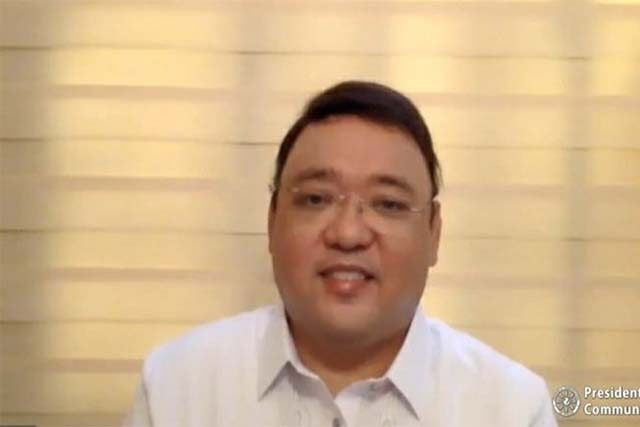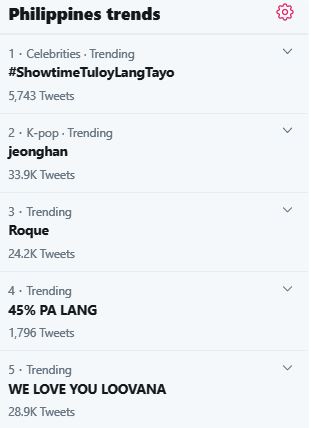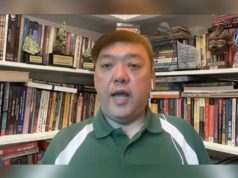
Presidential spokesperson Harry Roque was accused of embodying “toxic positivity” when he remarked that the results of a survey on Filipino joblessness reaching more than 40% were something that “could have been worse.”
The Palace official in a virtual press briefing on Monday shared his remarks about the survey of the Social Weather Stations (SWS) about adult joblessness conducted from July 3 to 6, 2020 through mobile phones and computer-assisted telephone interviews.
The results of the survey, released on August 16, revealed that jobless Filipinos reached a “record high” number of 45.5% since the 34.4% recorded in March 2012.
The polling firm said that the jobless Filipinos consisted of “those who voluntarily left their old jobs, are seeking jobs for the first time or lost their jobs due to economic circumstances beyond their control.”
SWS concluded that “half lost their job/livelihood during the COVID-19 crisis” and that 84% of the jobless are Filipinos who said that their quality of life got worse compared to a year ago.
“The survey found that one out of five (21%) adult Filipinos – or half of the 42% with no job/livelihood at the time of the interview – lost their job/livelihood during the COVID-19 crisis. The other 21% lost their job/livelihood before the crisis,” it said.
“The rest either have a job/livelihood at the time of the interview (47%) or never had a job/livelihood before (11%). The proportion of those who lost their job/livelihood during the COVID-19 crisis is slightly higher in urban areas (23%) than in rural areas (18%),” SWS added.
It said that the joblessness was highest in Balance Luzon at 23%, followed by the Visayas at 19%, Mindanao at 19% and Metro Manila at 18%.
Meanwhile, Roque in response to the survey’s results said that he was “delighted” that not everyone lost their jobs and that he was “surprised” at the Filipino’s “resilience.”
“Ako po’y nagagalak na hindi tayo 100% nawalan ng trabaho kasi sa tagal po na naka-lockdown tayo, I’m still surprised at our resilience, at 45 % pa lang po ang nawawalan ng trabaho. It could have been worse kasi nga po complete lockdown ang nangyayari sa atin,” he said.
Asked for the government’s plan on addressing the high rate of unemployment, Roque responded that the Department of Labor and Employment has two ongoing programs to augment these woes.
“Iyong AKAP para doon sa mga nawalan ng trabaho at saka iyong work for pay na TUPAD. At bukod pa po diyan, nakapaloob na po sa Bayanihan II iyong stimulus package na pinag-uusapan natin – magpapautang po tayo nang mas maraming pera sa mga magsasaka, sa mga maliliit na mga negosyante, small and medium enterprises; at magkakaroon po tayo ng mga credit guarantees,” Roque said.
“Sa turismo po, ang isang proposal na nanggaling sa Senado, ten billion package na puwede nilang utangin at low interest rates. So in other words po, gagamitin po natin hindi lang iyong kaban ng bayan kung hindi iyong mga inutang natin para ma-stimulate po ang economy,” he said.
“And the best way of stimulating the economy is, number one, iyong work for pay program natin kagaya ng TUPAD; at number two, iyong financial assistance to small and medium enterprises. At hindi po natin inaalis iyong possibility of providing assistance doon sa mga strategic industries bagama’t hindi po sila small and medium scale,” the spokesman added.
Labor Assistant Secretary Nikki Tutay told CNN Philippines that while the poll was correct in showing a “super high” joblessness rate, the government has a different metric on tracking down unemployment.
Official labor statistics for July will be reportedly released by the Philippine Statistics Authority on September 4.
‘Nagagalak’
Roque’s remarks on resiliency did not sit well with some Filipinos who pointed out that he was supposedly embodying “toxic positivity” with the situation where half of the workforce lost their jobs.
It earned him to land in local Twitter’s top trending list on Monday afternoon, as well as the phrase “45% pa lang.”

ABS-CBN broadcast journalist Karen Davila noticed that Roque used the word “nagagalak” in his comment, which meant “delighted” in English.
Did Sec Roque really use the word “nagagalak”? https://t.co/D2w2huge6p
— Karen Davila (@iamkarendavila) August 17, 2020
Physician and medical anthropologist Gideon Lasco likewise took note of some of Roque’s words in the joblessness survey.
"Nagagalak"?
"45% pa LANG ang nawawalan ng trabaho"??
"Resilience"???
Shame on you, Harry Roque – what a despicable piece of living vomitus you have become. https://t.co/BHu8A5QwjX
— Gideon Lasco (@gideonlasco) August 17, 2020
Another Twitter user accused him of supposedly showing “toxic positivity” amid the situation.
“These figures are real people, not just mere numbers, Roque. Until when is our government going to be out of touch with the needs of its people? What we need is a concrete COVID-19 plan Roque, not your toxic positivity,” she wrote.
“Roque is f**king romanticizing every s*it happening under Duterte administration. This is toxic positivity at its worst,” commented another online user.
A Filipino took note of the definition of the term lifted from mental health service The Psychology Group and applied it in the context of Roque’s remarks about joblessness.
“Toxic positivity (noun). The overgeneralization of a happy, optimistic state that results in the denial, minimization, and invalidation of the authentic human emotional experience,” the online user quoted.
“Just like anything done in excess, when positivity is used to cover up or silence the human experience, it becomes toxic. By disallowing the existence of certain feelings, we fall into a state of denial and repressed emotions,” the mental health service added.
This was not the first time that Roque employed the same logic in terms of responding to previous surveys.
Philstar.com reported four instances in which the Palace official similarly failed to acknowledge the worsening circumstances surrounding Filipinos and the COVID-19 pandemic.
Roque was previously urged by critics to refrain from “downplaying” the number of coronavirus cases in the country, as well as the death toll.
Last July, he said that the public should not be thoroughly disturbed by the number of cases since majority of the infected were “mild” and “asymptomatic.”
Roque was also chided for saying that the country’s breach of the seventy thousandth mark in terms of total coronavirus cases was not something to be alarmed about.
The Philippines has a total of 164,474 coronavirus cases, in which 49,034 are currently infected as of August 17. Fatalities stood at 2,681 while those who have recovered are 112,759.









